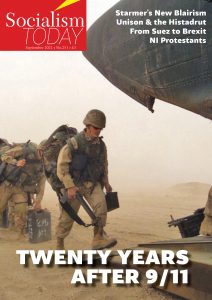
Within days of telling the Financial Times (August 5) how “very proud” he was of the New Labour governments of Tony Blair and Gordon Brown from 1997 to 2010, the Labour leader Sir Keir Starmer made it clear that his left-wing predecessor Jeremy Corbyn would remain suspended from the Parliamentary Labour Party (PLP) unless he engaged in an abject renunciation of his own past.
These moves came shortly after July’s marathon meeting of Labour’s ruling national executive committee (NEC), which had taken further steps to consolidate the grip of the right-wing.
Corbyn was suspended in November 2020 for responding to the outrageously tendentious report of the Equality and Human Rights Commission (EHRC) into antisemitism in the Labour Party under his leadership (see The Establishment HRC Does The Job, in Socialism Today No.244, December-January 2020/21).
Read more